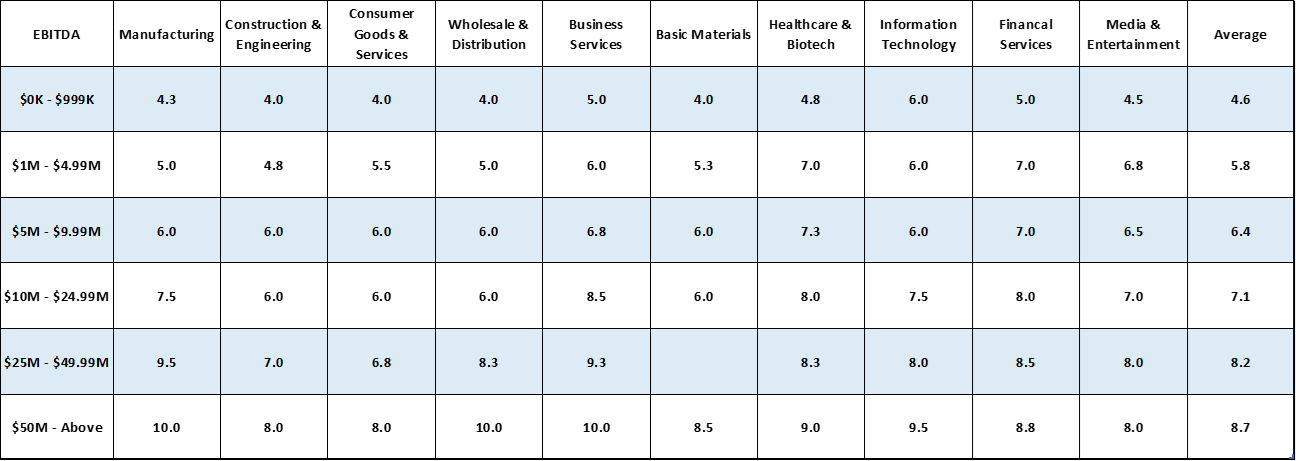If you’re a business owner, at some point, you’ve likely wondered, “What is my business worth?” This question isn’t just a fleeting thought or a product of mere curiosity; it’s fundamental to your role as an owner. Determining the value of a business goes beyond just seeing figures on a balance sheet – it’s about understanding the essence of your hard work, the tangible and intangible assets you’ve cultivated, and the transferable value future owners could possess.
Understanding the value of your business is crucial for various reasons, from selling or acquiring financing to succession planning and beyond. So, how exactly is the value of a business determined? Let’s dive deep into the intricacies of business valuation.
3 Common Valuation Methods

1. Earnings Multipliers
This method involves multiplying the business earnings (or EBITDA) by a certain number. This multiplier is often derived from industry standards or the valuation of similar businesses. An excellent initial step is to examine public data from major corporate mergers and acquisitions. While such data can be found online, I prefer the charts from NYU (Here). This data sheds light on the variability of EBITDA multiples across industries. However, when reviewing these multiples, manage your expectations. A 12x multiplier, for instance, might be typical for a well-established $50 million EBITDA company with a strong brand and deep management hierarchy. These examples illustrate how specific industries appeal more to investors, resulting in them commanding higher multipliers compared to others.
To determine a suitable earnings multiplier for a smaller business, you’ll need to make an adjustment for size, particularly if you cannot locate direct size-wise comparables for your business. When doing this, you may need to adjust the EBITDA multiples derived from larger transactions. The extent of this adjustment can vary based on judgment, but it should account for the heightened risks and complexities inherent to smaller ventures. Refer to the following chart, which illustrates the variation in earnings multiples based on company size.
Median Deal Multiples by EBITDA Size of Company

2. Discounted Cash Flow (DCF)
At its core, the Discounted Cash Flow (DCF) method is a way to determine the value of an investment based on the future cash flows it is expected to produce. Imagine you’re considering investing in a machine for your business. Instead of just looking at the upfront cost, you’d want to know how much money this machine will bring in for you over its useful life. The DCF method helps you do just that by calculating the present value of all future cash flows this machine will generate. In simpler terms, it’s like asking, “How much is the future money this machine will make worth in today’s dollars?”
The reason DCF is sometimes used, especially by investors and business owners, is because money today is typically considered to be worth more than the same amount in the future. This is due to inflation, the opportunity to earn interest, and the inherent risks of waiting for money. So, if you’re comparing multiple investments or business decisions, DCF allows you to compare their values on equal footing by adjusting future earnings to today’s value.
3. Comparable Sales
When trying to figure out how much a business is worth, one effective method is to look at the sales prices of similar businesses. This approach is a bit like determining the value of a house by looking at the recent sale prices of nearby homes with similar features. By examining what others are willing to pay for similar businesses, you can get a ballpark figure for what your business might be worth in the current market. This is particularly useful when you have a unique business type and you’re uncertain about how to assess its value.
However, while some of this sales data might be publicly available, many business transactions remain private, known only to the parties involved. This is where business brokers or valuation experts come in handy. These professionals have access to exclusive databases and networks through industry organizations and associations, which provide insights into private sales data. They can pull from this rich pool of information to identify comparables that genuinely match your business’s profile. Furthermore, they have the experience to adjust for any differences between your business and the comparables to ensure a more accurate valuation. Working with a broker or expert not only streamlines the valuation process but also ensures you’re getting the most accurate and informed assessment possible.
Conclusion
In conclusion, understanding the actual value of a business is both an art and a science. While some methods and metrics can guide us, the objective measure of a business’s worth comes down to what an investor is genuinely willing to pay. It’s essential to remember that, unfortunately, many businesses don’t find a buyer, often due to high asking prices stemming from an owner’s emotional attachment and overestimation of its value. To avoid this pitfall and ensure your business is priced realistically, seek the expertise of professionals.
Business brokers, accountants, attorneys, and valuation experts have a wealth of knowledge and resources at their fingertips. They can provide invaluable guidance to navigate the complexities of business valuation. After all, the ideal price for a business allows for a seamless transition into new hands, ensuring the legacy of the venture and the financial return for the owner. Don’t hesitate to contact these professionals; their insights could be the difference between a successful sale and a missed opportunity.



